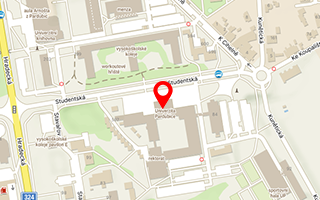Course title: Introductory Course on the Latest Knowledge for Instructors and Examiners of Training Organizations
Designed for: Prospective instructors and examiners of training organizations for aircraft maintenance technicians
Aim: Acquisition of knowledge in the subjects of aviation legislation, human factors and methods of conducting training, which is necessary for the performance of the instructor or examiner of a training organization and familiarisation with changes in aviation law that occurred after the accession of the Czech Republic to the EU
Entry requirements: Written recommendation from the training organization.
Place: The theoretical course takes place at UPa DFJP or subcontractors' premises
Form and methods of teaching: The theory is taught in the form of lectures in classrooms equipped with overhead projector, video, visualizer and computer technology with the teaching programme. Lectures are conducted in Czech or English. Each participant receives their teaching material.
Duration: Theoretical training 24 hours (3 days)
Practical training: 0 hours
Examinations: Not conducted.
Certificate: A certificate of completion is issued to the graduate at the end of the course.
AVIATION LEGISLATION
Total hours per course: 4
Level
1 EASA 1
Structure, Scope, Regulations and Directives of EASA
2 Commission Regulation (EU) No 1321/2014 1
Division, Effect, Differences from JAR Regulations
HUMAN FACTORS
Total hours per course: 5
Level
1 In general 2
The need to assess the influence of human factors, Incidents caused by human factors/errors, Murphy's Law.
2 Factors affecting performance 2 Fitness/health, Stress from home and work environment,
Time pressure and deadlines, Workload: overload and underload,
Sleep and fatigue, Shift work, Alcohol, Medication, Medication abuse.
3 Tasks 1
Physical work, Repetitive tasks, Visual inspection, Complex systems.
4 Communication 2
Communication within and between working teams, Work recordings and entries,
Updates, Validity period, Dissemination of information.
5 Human errors 2
Model examples and error theory, Types of errors in maintenance tasks, Consequences of errors (e.g. accidents), Error prevention and correction.
6 Workplace risks 2
Risk recognition and prevention, Emergency response.
TRAINING METHODS – PEDAGOGY
Total hours per course: 15
Level
1 Self-education process 1
Motivation, Perception and understanding, Memory and its use, Habits and transfer, Barriers to self-education, Incentives to self-education, Methods of self-education, Intensity of self-education.
2 Teaching process 1
Elements of effective teaching, Planning teaching activities, Teaching methods, Teaching from the "known" to the "unknown", Use of lesson plans.
3 Philosophy of training 1
Benefits of a structured (approved) training course, Importance of a planned curriculum, Integration of theoretical knowledge and practical training.
4 Teaching methods used 1
(a) Theoretical knowledge – Methods of classroom teaching
Use of training aids, Group lectures, Individual preparation, Student participation/discussion.
(b) Practical training – Methods of teaching in practice
Training environment, Methods used in teaching, Judgement and decision making in practice.
5 Student assessment and testing 2
(a) Assessment of student performance
The role of qualifying examinations, Knowledge recovery, Process of transforming knowledge into understanding, Application of understanding in activities, Necessity to evaluate the rate of progress.
(b) Analyses of student errors
Identify the cause of errors, Address significant errors first, then less significant ones, Avoid excessive criticism, Need for clear and concise communication.
6 Developing a training programme 1
Lesson planning, Preparation, Explanation and demonstration, Student participation and practice, Evaluation
7 Human performance and limitations in relation to practical training 1
Physiological factors, Psychological factors, Human information processing, Behavioural beliefs, Development of judgment and decision-making skills.
8 Hazards arising from simulated system failures and malfunctions 2
Importance of drill, Situational awareness, Following correct procedures.
9 Training administration 1
Theoretical/practical training records, Personal notebook, Theoretical/practical training plan, Study texts, Official forms, Handbooks, Aircraft documents, Licence regulations.
Contact person: doc. Ing. Vladimír Němec, PhD; vladimir.nemec@upce.cz

